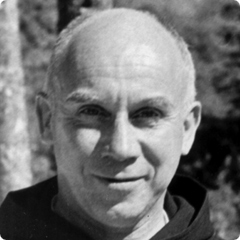"God utters me like a word containing a partial thought of himself."
Thomas Merton (1915–1968)
Essayist
CC 1938 MA 1939
An essayist and poet, Thomas Merton was a cloistered monk who improbably became a leading literary and cultural figure in the 1950s and 1960s. He lived for many years at the Abbey of Gesthemani, a Trappist monastery in central Kentucky, where he was known as Father Louis. In 1944, he published Thirty Poems under his secular name, and was encouraged by Abbot Frederic Donne to write an autobiography. The resulting account of his awakening and conversion - The Seven Storey Mountain, published in 1948 - became a surprise bestseller, earning Merton widespread renown and inspiring many Americans to undertake spiritual retreats of their own. In the years that followed, Merton continued to keep and sometimes publish his personal journals and also wrote extensively on literature. He carried on a substantial correspondence with old friends, religious leaders, and leading writers, and in the 1960s turned outward to address the pressing issues of that era, including race relations, economic inequality, and the nuclear arms race. A growing interest in eastern mysticism prompted a trip to India, highlighted by a visit with the Dalai Lama. It was later in the same journey, at a religious gathering in Thailand, that Merton died by accidental electrocution.
|


